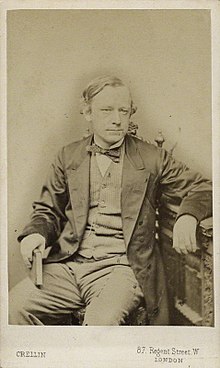John Robert Seeley
| John Robert Seeley | |
|---|---|

Seeley (photograph by Philip Crellin, 1866)
|
|
| Born |
10 September 1834 London, England, Great Britain |
| Died | 13 January 1895 (aged 60) Cambridge |
| Residence | Cambridge, England, Great Britain |
| Alma mater | Christ's College, Cambridge |
| Occupation | Historian |
| Notable work | Expansion of England |
| Spouse(s) | Mary Agnes Phillot |
Sir John Robert Seeley, KCMG (10 September 1834 in London – 13 January 1895 in Cambridge) was an English essayist and historian. He is most known for his book Expansion of England, written from the perspective of a contemporary historian, but influences historical discussions about empire to this day.
Seeley was born in London and was the son of R. B. Seeley, a publisher and the author of several religious books and of The Life and Times of Edward I. After developing a taste for religious and historical subjects, Seeley was educated at the City of London School and Christ's College, Cambridge, where he was head of the classical tripos and senior chancellor's medallist and was elected fellow and became classical tutor of his college. For a time, he was a master at his old school, and in 1863, he was appointed professor of Latin at University College, London. He was made Regius Professor of Modern History, Cambridge in 1869.
In August 1869, Seeley married Mary Agnes Phillot, who survived him. He is buried in the Mill Road Cemetery, Cambridge, with his wife.
Seeley's essay Ecce Homo (published anonymously in 1866 and afterwards acknowledged by him) was widely read and prompted many replies, as it was deemed an attack on Christianity. Dealing only with Christ's humanity, it dwells on his work as the founder and king of a theocratic state and points out the effect that the society, his church, has had upon the standard and active practice of morality among men. Seeley intended the book as "a fragment" and the text did not deny the truth of those doctrines, which it did not address, but many critics still found fault with its treatment of Christ. Many considered the book to be valuable not only in its content but also in its style, as it is characterised by relatively terse and fluid writing.
His later essay on Natural Religion, which denied that supernaturalism is essential to religion and maintained that the negations of science tend to purify rather than destroy Christianity, satisfied no one and excited far less interest than his earlier work. In 1869, he was appointed professor of modern history at the University of Cambridge. He was a popular instructor and prepared his lectures carefully, which were largely attended. In historical work, he is distinguished as a thinker rather than as a scholar. He valued history solely in its relation to politics, as the science of the state. He maintained that history should be studied scientifically and for a practical purpose, the solution of existing political questions. Thus, he naturally devoted himself mainly to recent history, especially to the relations between England and other states. His Life and Times of Stein, a valuable narrative of the anti-Napoleonic revolt, led by Prussia mainly at Heinrich Friedrich Karl von und zum Stein's instigation, was written under German influence and shows little of the style of his short essays. Its length, its colourlessness, and the space it devotes to subsidiary matters render it unattractive.
...
Wikipedia
